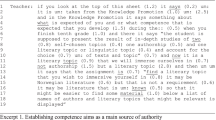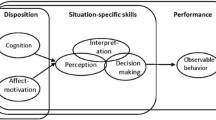Abstract
This paper investigates the construction of systems of competence in two middle school mathematics classrooms. Drawing on analyses of discourse from videotaped classroom sessions, this paper documents the ways that agency and accountability were distributed in the classrooms through interactions between the teachers and students as they worked on mathematical content. In doing so, we problematize the assumption that competencies are simply attributes of individuals that can be externally defined. Instead, we propose a concept of individual competence as an attribute of a person's participation in an activity system such as a classroom. In this perspective, what counts as “competent” gets constructed in particular classrooms, and can therefore look very different from setting to setting. The implications of the ways that competence can be defined are discussed in terms of future research and equitable learning outcomes.



Similar content being viewed by others
Notes
This move simultaneously serves to reinforce the relative power difference between teacher and students by indexing the teacher's position relative to the student as the person who is responsible for determining the flow of activity and the direction of the discussion (Lemke 1990). Although students can also utter the same words, the meaning of such an utterance is slightly different as it does not (usually) promise the same kinds of potential outcomes (namely, good grades). In some rare classrooms this structure can be disrupted, but it is difficult to imagine a complete reversal of these positions.
A person's agency in a brief episode of interaction is, in part, whether he or she initiates an idea, agrees with, elaborates on, questions, or disagrees with what someone else initiated, or refrains from responding. It also depends on whether her or his action is accepted, elaborated, questioned, challenged, or ignored.
Here, we are talking about characteristic ways of engaging in the classroom, at the level of what Cobb and his colleagues (Cobb and Yackel, 1998; Forman 1996; Yackel and Cobb, 1996) call social norms. Learning, as we and others conceive of it, can be seen through individual students' changes in participation with respect to particular content (c.f. Lave and Wenger 1991). Thus, although often students have characteristic ways of participating in the classroom activity system (c.f. Gresalfi 2004), their participation may change, particularly with respect to their engagement with particular ideas. These processes are intermingled, as students' participation with the social norms of the classroom (i.e. tendency to justify ideas or not) shapes the ways that she might engage with particular mathematical ideas, and vice versa.
However, whether the inference of competence is justified by a positive evaluation of performance depends on the way in which the participants attribute causality for the valuable contribution. For example, that inference can be qualified or negated if there is evidence of a different causal attribution (e.g., “That was a lucky guess”).
It is important to note here that although we have focused on how competence is constructed at the level of the classroom, this does not mean that all student behaviors in the classroom are likely to be positioned in exactly the same way. Although this was not the focus of our analysis, it is likely that individual experiences, such as students' histories in the classroom, their sensitivities to particular kinds of opportunities to participate, or even membership in particular racial, ethnic, or gender groups, could shape the likelihood of particular students being reified as competent (or not; c.f. Jungwirth 1991).
Of particular concern is an issue raised by Stein et al. (2000), and others, who note that it is far too common for teachers, in their attempt to make their expectations clear to their students, to limit the cognitive demand of tasks. In such cases, students end up following a set of prescribed rules or steps, rather than engaging in a task that involves meaning-making.
References
Amit, M., & Fried, M. N. (2005). Authority and authority relations in mathematics education: A view from an 8th grade classroom. Educational Studies in Mathematics, 58(2), 145–168, doi:10.1007/s10649-005-3618-2.
Bauersfeld, H. (1992). Classroom cultures from a social constructivist’s perspective. Educational Studies in Mathematics, 23, 467–481, doi:10.1007/BF00571468.
Bauersfeld, H. (1995). The structuring of the structures: Development and function of mathematizing as a social practice. In L. P. Steffe, & J. Gale (Eds.), Constructivism in education (pp. 137–159). Hillsdale, NJ: Erlbaum.
Boaler, J. (1999). Participation, knowledge, and beliefs: A community perspective on mathematics learning. Educational Studies in Mathematics, 40, 258–281, doi:10.1023/A:1003880012282.
Brown, T. (1994). Creating and knowing mathematics through language and experience. Educational Studies in Mathematics, 27, 79–100, doi:10.1007/BF01284529.
Brown, A. L., & Campione, J. C. (1994). Guided discovery in a community of learners. In K. McGilly (Ed.), Classroom lessons: Integrating cognitive theory and classroom practice. Cambridge, MA: MIT Press.
Cobb, P. (1999). Individual and collective mathematical learning: The case of statistical data analysis. Mathematical Thinking and Learning, 1, 5–44, doi:10.1207/s15327833mtl0101_1.
Cobb, P. (2000). Accounting for mathematical development in the social context of the classroom. In L. P. Steffe, & P. Thompson (Eds.), Radical constructivism in action: Beyond the pioneering work of Ernst von Glasersfeld (pp. 152–178). London: Falmer.
Cobb, P., Gresalfi, M. S., & Hodge, L. (2008). An interpretive scheme for analyzing the identities that students develop in mathematics classrooms. Journal for Research in Mathematics Education (in press).
Cobb, P., Stephan, M., McClain, K., & Gravemeijer, K. (2001). Participating in classroom mathematical practices. Journal of the Learning Sciences, 10, 113–164, doi:10.1207/S15327809JLS10-1-2_6.
Cobb, P., Wood, T., & Yackel, E. (1992). Learning and interaction in classroom situations. Educational Studies in Mathematics, 23, 99–122, doi:10.1007/BF00302315.
Cobb, P., Wood, T., & Yackel, E. (1993). Discourse, mathematical thinking, and classroom practice. In N. Minick, E. A. Forman, & A. Stone (Eds.), Education and mind: Institutional, social, and developmental processes (pp. 91–119). Oxford: Oxford University Press.
Cobb, P., Wood, T., Yackel, E., & McNeal, G. (1992). Characteristics of classroom mathematics traditions: An interactional analysis. American Educational Research Journal, 29, 573–602.
Cobb, P., & Yackel, E. (1998). A constructivist perspective on the culture of the mathematics classroom. In F. Seeger, J. Voigt, & U. Waschescio (Eds.), The culture of the mathematics classroom: Analysis and changes (pp. 158–190). New York: Cambridge University Press.
Delpit, L. (1995). The silenced dialogue: Power and pedagogy in educating other peoples' children. In L. Delpit (Ed.), Other people's children (pp. 21–47, 186–186). New York, NY: The New Press.
Engeström, Y. (1993). Developmental studies of work as a testbench of activity theory: The case of primary care medical practice. In S. Chaiklin, & J. Lave (Eds.), Understanding practice: Perspectives on activity and context (pp. 64–103). Cambridge: Cambridge University Press.
Gee, J. P. (1999). An introduction to discourse analysis: Theory and method. London: Routledge.
Goffman, E. (1981). Forms of talk. Philadelphia: University of Pennsylvania Press.
Greeno, J. G. (1991). Number sense as situated knowing in a conceptual domain. Journal for Research in Mathematics Education, 22, 170–218, doi:10.2307/749074.
Greeno, J. G. (2006). Learning in activity. In R. K. Sawyer (Ed.), The Cambridge handbook of the learning sciences (pp. 79–96). Cambridge: Cambridge University Press.
Greeno, J. G., & Gresalfi, M. S. (2008). Opportunities to learn in practice and identity. In P. A. Moss, D. C. Pullin, J. P. Gee, E. H. Haertel, & L. J. Young (Eds.), Assessment, Equity, and Opportunity to Learn. New York: Cambridge University Press.
Greeno, J. G., & MMAP (1998). The situativity of knowing, learning, and research. The American Psychologist, 53, 5–26, doi:10.1037/0003-066X.53.1.5.
Gresalfi, M. S. (2004). Taking up opportunities to learn: Examining the construction of participatory mathematical identities in middle school students. Dissertation, Stanford University.
Gutiérrez, R. (2004). The complex nature of practice for urban (mathematics) teachers. Paper presented at the Rockefeller Symposium on the Practice of School Improvement: Theory, Methodology, and Relevance, Bellagio, Italy, August
Hand, V. (2003). Reframing participation: How mathematics classrooms afford opportunities for mathematical activity that is meaningful to students from diverse social and cultural backgrounds. Dissertation, Stanford University.
Henningsen, M., & Stein, M. K. (1997). Mathematical tasks and student cognition: Classroom-based factors that support and inhibit high-level mathematical thinking and reasoning. Journal for Research in Mathematics Education, 28(5), 524–549, doi:10.2307/749690.
Hiebert, J., Carpenter, T. P., Fennema, E., Fuson, K. C., Wearne, D., & Murray, H. (1997). Making sense: Teaching and learning mathematics with understanding. Portmouth, NH: Heinemann.
Holland, D., Skinner, D., Lachicotte Jr, W., & Cain, C. (1998). Identity in cultural worlds. Cambridge, MA: Harvard University Press.
Horn, I. S. (2008). Turnaround students in high school mathematics: Constructing identities of competence through mathematical worlds. Mathematical Thinking and Learning (in press).
Jungwirth, H. (1991). Interaction and gender—Findings of a microethnographical approach to a classroom discourse. Educational Studies in Mathematics, 22, 263–284, doi:10.1007/BF00368341.
Kilpatrick, J., Swafford, J., & Findell, B. (Eds.) (2001). Adding it up: Helping children learn mathematics. Washington, DC: National Academy Press.
Ladson-Billings, G. (1997). It doesn’t add up: African American students’ mathematical achievement. Journal for Research in Mathematics Education, 28(6), 697–708, doi:10.2307/749638.
Lampert, M. (1990). When the problem is not the question and the solution is not the answer: Mathematical knowing and teaching. American Educational Research Journal, 27, 29–63.
Lampert, M. (2001). Teaching problems and the problems of teaching. New Haven, CT: Yale University Press.
Lave, J. (1988). Cognition in practice: Mind, mathematics and culture in everyday life. New York: Cambridge University Press.
Lave, J. (1991). Situating learning in communities of practice. In L. B. Resnick, J. M. Levine, & S. D. Teasley (Eds.), Perspectives on socially shared cognition (pp. 63–82). Washington, DC: American Psychological Association.
Lemke, J. L. (1990). Talking science. Norwood, NJ: Ablex.
Lemke, J. L. (2000). Across the scales of time: Artifacts, activities, and meanings in ecosocial systems. Mind, Culture, and Activity, 7(4), 273–290, doi:10.1207/S15327884MCA0704_03.
McDermott, R. (1993). The acquisition of a child by a learning disability. In S. Chaiklin, & J. Lave (Eds.), Understanding Practice. Cambridge: Cambridge University Press.
Moses, R. P., & Cobb, C. E. (2001). Radical equations: Math literacy and civil rights. Boston: Beacon Press.
National Council of Teachers of Mathematics.(2000). Principles and standards for school mathematics. Retrieved September 26, 2002, from http://standards.nctm.org/document/index.htm.
National Mathematics Advisory Panel (2008). Foundations for success: The final report of the National Mathematics Advisory Panel. Washington, DC: US Department of Education.
Pickering, A. (1995). The mangle of practice: Time, agency, and science. Chicago, IL: University of Chicago Press.
Pope, D. (2001). Doing School: how we are creating a generation of stressed out, materialistic, and miseducated students. New Haven, CT: Yale University Press.
Schoenfeld, A. H. (1999). Looking toward the twenty-first century: Challenges of educational theory and practice. Educational Researcher, 28(7), 4–14.
Stein, M. K., Smith, M. S., Henningsen, M. A., & Silver, E. A. (2000). Implementing standards-based mathematics instruction: A casebook for professional development. New York: Teacher College Press.
Yackel, E., & Cobb, P. (1996). Sociomathematical norms, argumentation, and autonomy in mathematics. Journal for Research in Mathematics Education, 27, 458–477, doi:10.2307/749877.
Author information
Authors and Affiliations
Corresponding author
Additional information
This research was supported by a grant from the U.S. National Science Foundation. We are grateful that this project afforded collaboration with Frank Davis, Mary Maxwell West, and Robert Moses.
Rights and permissions
About this article
Cite this article
Gresalfi, M., Martin, T., Hand, V. et al. Constructing competence: an analysis of student participation in the activity systems of mathematics classrooms. Educ Stud Math 70, 49–70 (2009). https://doi.org/10.1007/s10649-008-9141-5
Received:
Accepted:
Published:
Issue Date:
DOI: https://doi.org/10.1007/s10649-008-9141-5




